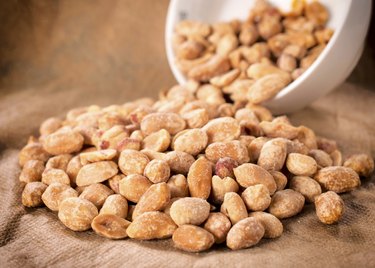
Peanuts are a high-energy food containing an abundance of healthful fats, protein and fiber, as well as a wide array of vitamins and minerals. Your body digests peanuts with the same physical and enzymatic processes employed for other foods that contain a mixture of nutrients. Unless you have a peanut allergy or a preexisting medical condition that interferes with your digestive processes, your body should be able to digest peanuts without difficulty.
Protein
Video of the Day
Digestible proteins account for roughly 25 percent of the weight of peanuts, reports the "Alternative Field Crops Manual." The protein in peanuts includes all of the essential protein building blocks, or amino acids, your body requires. Digestion of peanut protein begins in your stomach and continues in your small intestine, where nutrient absorption occurs. A 1-ounce serving of roasted peanuts provides your body with roughly 7 to 8 grams of protein.
Video of the Day
Fats
The "Alternative Field Crops Manual" notes that peanuts are approximately 42 to 52 percent oil by weight. The oil in peanuts consists primarily of unsaturated, heart-healthy fats. A 1-ounce serving of peanuts contains 14 to 15 grams of fat, of which roughly 85 percent is mono- and polyunsaturated fats. As with other high-fat foods, the amount of fat in peanuts causes them to stay in the stomach longer than low-fat foods. This phenomenon indicates not poor digestibility, but rather a physiologically beneficial adaptation. Because it is an energy-rich fuel, fat is a precious metabolic commodity. The slow rate of transfer of peanuts and other fatty foods from the stomach to the small bowel helps ensure that your intestine has adequate time to completely digest and absorb as much dietary fat as possible.
Fiber
Peanuts are not true nuts; they are legumes, the technical term for dry beans. Like other beans and vegetables, peanuts contain a substantial amount of plant fiber. Your intestines do not digest plant fiber, regardless of the food source. For this reason, you may occasionally notice fibrous remnants of peanuts in your stool a day or two after consuming the nuts. The presence of these fiber remnants does not indicate lack of digestion of other nutrients in the nuts.
Warning Signs
Although peanuts are normally digested by the human digestive tract, allergies and certain gastrointestinal problems may interfere with normal breakdown and absorption of various foods. If you experience nausea, vomiting, abdominal pain, excess intestinal gas, diarrhea, constipation, hives or other unexplained symptoms after eating peanuts, talk with your doctor. If you experience shortness of breath, call 9-1-1.
- Alternative Field Crops Manual: Peanut
- USDA Agricultural Research Service: What's in the Foods You Eat Search Tool
- American Peanut Council: Nutritional Value of Peanut Products
- Colorado State University Pathophysiology Hypertext: Control of Gastric Emptying
- Colorado State University Extension: Dietary Fiber
- Canadian Medical Association Journal: Peanut Allergy: An Overview
- American Academy of Allergy, Asthma and Immunology: Food Allergies Versus Food Intolerance
Is this an emergency? If you are experiencing serious medical symptoms, please see the National Library of Medicine’s list of signs you need emergency medical attention or call 911.